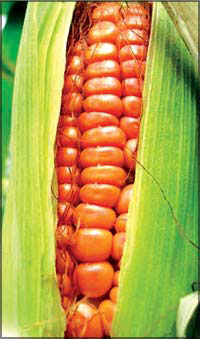|

Multivitamin
corn,
or how genetic engineering is like building a Porsche:
In a triumph of nutritional enhancement, scientists in Spain and
Germany have genetically engineered South African elite white corn to
produce high levels of three vitamins in its kernels. The modified corn
appears orange due to beta carotene, a vitamin that gives carrots their
orange color.
Cereal grains like rice, wheat and corn lack essential vitamins and
minerals. Fruits and vegetables supplement nutrients lacking in grains,
but in poor areas of the world with reduced access to fruits and
vegetables, a monotonous grain diet poses a health problem. About 40 to
50 percent of the world's population suffers from a disease caused by
vitamin or mineral deficiency, according to the Food and Agriculture
Organization of the United Nations.

One solution is to generate corn that contains vitamins normally
found in fruit. Scientists have genetically engineered plants to contain
higher levels of a single nutrient - beta carotene fortified rice or
lycopene rich tomatoes - but this ignores deficiencies in other
nutrients, such as ascorbate (vitamin C) and folate (vitamin B9).
Shaista Naqvi, Changfu Zhu and Paul Christou and their colleagues
have raised the bar by adding five genes and gene fragments from two
different bacteria, barley, wheat, rice and a different variety of corn
to white corn, essentially introducing new assembly lines for 3
vitamins, beta carotene, ascorbate and folate, normally absent from
white corn. The added genes provide the machinery allowing the corn to
produce these nutrients.
It's like taking the Porsche automobile plant in Stuttgart, Germany,
which produces the sleek and small 911 sports car, and modifying it so
that it also produces the large and boxy Cayenne sport utility vehicle.
The Cayenne is so different from the 911 that it is produced in a
separate factory in Leipzig - which should give you an idea of how
amazing it is to be able to add the machinery to produce three new
vitamins in corn.White corn is the predominant food corn in sub-Saharan
Africa. A typical 100 or 200 gram portion of the new, vitamin-rich corn
would provide the recommended daily intake of beta carotene (the source
of vitamin A), an "adequate" level of folate (undefined by the authors)
and 20 percent of the recommended levels of ascorbate.
Scientists hope that their work leads to the development of cereals
"loaded with vitamins, minerals, essential amino acids and long-chain
polyunsaturated fatty acids, providing a nutritionally complete meal
without the need for artificial supplementation."
Cost-benefit analysis and other policy studies must be examined
before introducing such crops locally. But it's clear, according to the
authors, that the results from genetic engineering are better than
conventional breeding.
The best fortification strategies will likely involve genetic
engineering and conventional breeding.
Source: Internet |

